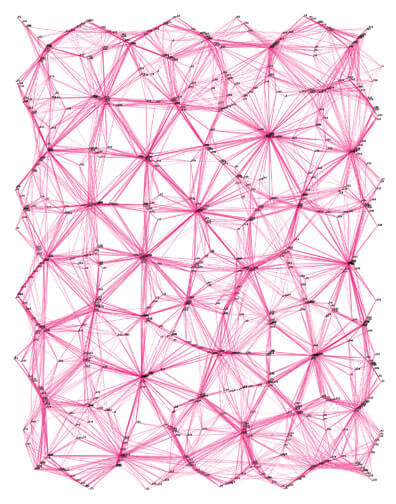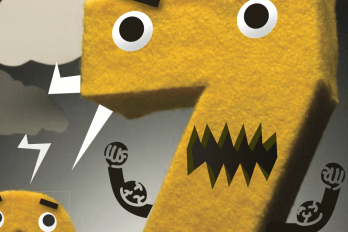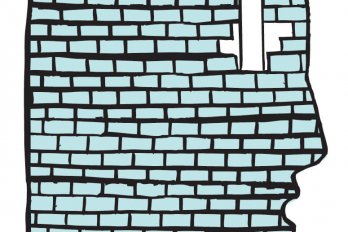
Online Only: A representative smattering of Georgie Binks’ e-mails.A couple of months ago, I was in the middle of one of those grand reveries we all indulge in every so often: I was imagining my funeral. After pondering the finer details (finger food or steam tables, Metallica or Elgar), I started debating what I should leave to various people. I was mentally moving through my house and dispensing items when I arrived at my basement office.
Egad! What about my computer? My whole life is in the thing, and I’d never considered what to do with it. It holds, among other things, the novel I’ve slaved over for five years, legal files, about 6,000 emails, and a heck of a lot of photos, some of them pretty racy. (Yes, that’s really me on a topless beach, years ago. Those men sans clothing were, sigh, prospective Internet suitors. And that extremely well-endowed specimen? Research.)
I figured I’d better check around and see what everyone else was planning to do with their cyber remains. I was sure “Chris,” a married friend of mine who initiates all of his extramarital affairs online, would have some strategy in place. “I’ve saved all of the emails from [one former flame],” he confided, “because I still love reading them. They’re in a separate folder on my computer.” Chris carries his laptop with him everywhere, so his wife won’t find his personal stuff. But what if you were to die tomorrow? I asked him. “I do worry about that,” he said. “You don’t want your kids knowing your indiscretions.”
Then there’s the stuff we might actually want people to find, like our brilliant, unpublished manuscripts. I asked Governor General’s Award–winning playwright Judith Thompson if she had a plan to take care of all of her plays-in-progress. “I carelessly have not made any provision for my desktop in the event of my death,” she emailed back, “and the way I ride my bike every day without a helmet, it could happen sooner than the date I have in my mind.” A writer with a highly idiosyncratic voice, Thompson was horrified by the thought that someone would discover a half-finished play and take a stab at completing it.
I knew I’d hit on something big when I quizzed Frank Cipolla, one of the composers of the score for the off-Broadway show Evil Dead: The Musical, and he started worrying, too. He’s stored the entire development of the show (from conception to recording) on very specific music software. “How would anyone other than a musician know how to use my files? ” he squeaked. “I can’t leave everything to my mother — she doesn’t even know how to use a computer.”
Surely this is fodder for the next worldwide panic-cum-business opportunity. Lawyers should be sharpening their pencils. Not so, according to John Poyser of the Canadian Bar Association’s Wills, Estates, and Trusts section. He told me the cba has “no position” on the bequest of computers technology and that adding a provision to one’s will would suffice.
Perhaps it’s no great surprise that lawyers have missed the boat on this one — most of them are still faxing, for God’s sake. But what about the real money-makers? I called Steve Wozniak, inventor of the first Apple computer. “I don’t have time to figure out what to do with the stuff in my computer,” he said, adding, “I’m in the celebrity category where so many people write about me I don’t need to save anything.”
But as we continued to speak, I could tell the possibilities were starting to churn in his brain. “This really strikes out into a new area,” he said, sounding chirpier. “People could prepare to leave behind a lot of their records in a My-Space format, prepaid perhaps, so they could stay online forever and others could go back and see what they were all about . . . It’s probably a good business opportunity.” I ought to hang up now and get myself a lawyer, I thought. But Steve was probably emailing his Apple geeks as we spoke, and he’d be taking advance orders for iDead by sundown.
Turning my attention back to the “little picture,” I did the obvious and went to the web. “What happens to your online life when your real life has ended? ” is the tag line for beforeyouaregone.com, a blog started by Texas deacon Charles Martin in March 2006. He posts sporadically with tidbits — articles, websites, online forums — culled from around the world, addressing not only what information needs to be documented, but the various methods of capturing it and making it easily accessible, Martin says, “to those who will carry on the torch or just calmly put it out.”
But there just isn’t much out there to share, I discovered. Businesses are only starting to circle around. Billed as a solution to “password fatigue,” clipperz.com is a free confidential storage service for passwords, burglar alarm codes, credit and debit card details, pins, software keys, etc. Martin, who reviews the site on his blog, points out that it will soon also enable clients to “share secrets” with family and friends. Another website, mylastemail.com, run by the UK’s Alphatalk Limited, is way ahead of them.
The company offers online memorials that remain accessible to recipients of your choice for twenty-five years posthumously. Posting a document, picture, and video file is free, while uploading more material starts at around $10 annually. Mylastemail.com also offers obituaries and a book of condolences. The only things missing are the floral arrangements and the organ music.
The company doesn’t appear to be wildly popular. Browsing the obituaries turned up a grand total of four, one of them for an individual named Ali Baba. Martin believes the issue just isn’t on people’s radar, and told me the volume of response to his site has also been low. “I’m sure teens couldn’t care less about who should know their MySpace account password in case they end up in a coma.” Most people just don’t expect to die.
I was convinced I would never find anyone who had prepared for the Big Log Off, when I happened upon Shirley Chinneck. The seventy-nine-year-old artist, who lives in the Rocky Mountain community of Canmore, Alberta, has a fairly straightforward plan that doesn’t involve any fancy computer programs. She’s stored all her “life data” — computer codes, safety deposit box information, and bank account numbers — on a memory stick for her sons. Other than a commercial website, which she’s given them permission to close down when she dies, if they wish, she has no virtual legacy. “I don’t have time for chat rooms,” she explained, “and I’ve made a point of deleting most of my emails. Who’s going to have time to go through all of this stuff? ”
I’m with Shirley. My novel’s going on a memory stick, and I vow to resave every single time I work on it. I’ll alert my family to my password so they can access everything. Those questionable photos? I’ll look at them one more time and press Delete. I might also record some kind of video message on my webcam and write a couple of emails to be opened by close family members upon my demise. I’m almost feeling good about dying, in fact. Almost.
I still have to figure out what to do with all those emails — a tricky call. They’ve essentially taken the place of letters, which I’d never trash. On the other hand, I never would have sent and received thousands of letters in the past ten years. The correspondence of Virginia Woolf might merit publication in six volumes, but it’s unlikely this oeuvre would make the cut (“I can’t do Tuesday. How about Wednesday?”). And yet, because so much of our lives flows into our emails, I worry that erasing the lot would deprive my relatives of the right to properly grieve me. I heard about a woman who, after her teenage son died, found solace in reading his emails to friends.
And suddenly it hit me. We can delete all we want, but unless others do the same our emails will linger long after we’re gone.
A magazine editor with whom I was friendly died recently of breast cancer. I hadn’t known she was sick and never got to tell her what a fine person I thought she was. As I sat in front of my computer feeling sad, I discovered several cheery emails she’d sent me. They gave me the feeling I was still somehow in touch with her. There was no good reason to keep these messages, but I did. I’ve decided they will be part of my virtual estate, for the cyber-forensic specialists of the future to study.




